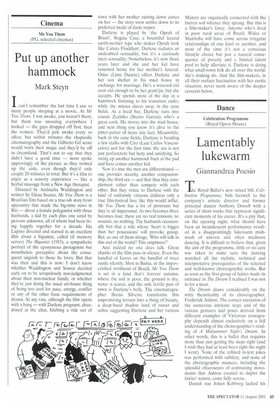Cinema
Me You Them (PG, selected cinemas)
Put up another hammock
Mark Steyn
Ican't remember the last time I saw so many people sleeping at a movie. At Me You Them, I was awake, you weren't there, but them was snoozing everywhere I looked — the guys dropped off first, then the women. They'd jerk awake every so often, but within minutes the rhapsodic cinematography and the Gilberto Gil score would work their magic and they'd be off in dreamland. That's not to say that they didn't have a good time — most spoke approvingly of the picture as they trotted up the aisle, even though they'd only caught 20 minutes in total. But it's a film to enjoy as a sensory experience — like a herbal massage from a New Age therapist.
Directed by Andrucha Waddington and written by Elena Soarez, Me You Them is a Brazilian film based on a true-ish story from upcountry that made the big-time news in Rio — about a female polygamist with three husbands, a kid by each plus one sired by persons unknown, all of whom had been living happily together for a decade. Ida Lupino directed and starred in an excellent film about a bigamist, called (if memory serves) The Bigamist (1953), a sympathetic portrait of the eponymous protagonist but nonetheless perceptive about the consequent anguish to those he loves. But that was then and this is now: I don't know whether Waddington and Soarez decided early on to be scrupulously non-judgmental about their non-nuclear family, or whether they're just doing the usual art-house thing of being too cool for pace, energy, conflict or any of the other basic requirements of drama, At any rate, although the film opens with a bang — with Darlene pregnant, abandoned at the altar, hitching a ride out of
town with her mother raining down curses on her — the story soon settles down to its preferred mode of dusty torpor.
Darlene is played by 'the Oprah of Brazil'. Regina Case, a bountiful fecund earth-mother type who makes Oprah look like Calista Flockhart. Darlene radiates an undoubted sensuality, but it's a curiously inert sensuality. Nonetheless, it's now three years later and she and her kid have returned home for her mother's funeral. Osias (Lima Duarte) offers Darlene and her son shelter in his mud house in exchange for marriage. He's a wizened old coot old enough to be her gram'pa, but she accepts. He spends most of the day in a hammock listening to his transistor radio, while the missus slaves away in the cane fields. At a local bar, Darlene runs into cousin Zezinho (Stenio Garcia), who's a great cook. He moves into the mud house, and next thing you know it's alive to the pitter-patter of more tiny feet. Meanwhile, back in the cane fields, Darlene is bending a few stalks with Ciro (Luiz Carlos Vasconcelos) and for the first time the sex is not just perfunctory but lusty and satisfying. So string up another hammock back at the pad and here comes another kid.
Now it's true the men are differentiated — one provides security, another companionship, the third sex — and that thus they complement rather than compete with each other. But they relate to Darlene with the kind of uniformly virtuous dullness only a true film-festival fave like this would inflict. Me You Them has a lot of pronouns but they're all impersonal. As two becomes three becomes four, there are no real tensions, no wounds, no nothing. The husbands occasionally fret that a wife whose 'heart is bigger than her possessions' will provoke gossip. But, as one of them shrugs, 'Who will talk in this end of the world? This emptiness?'
And indeed no one does talk. Great chunks of the film pass in silence. Even the handful of leaves on the handful of trees rustle silently. Shot in Bahia, in the impoverished northeast of Brazil, Me You Them is set in a land that's forever autumn, where the soil is poor, the ground is dry, water is scarce, and the only fertile part of town is Darlene's belly. The cinematographer Breno Silveira transforms this unpromising terrain into a thing of beauty, a deep-hued shadow land of russet and ochre suggesting Darlene and her various Misters are organically connected with the barren soil whence they sprang. But this is a film-maker's fancy. Anyone who's lived in poor rural areas of Brazil, Wales or Manitoba will have come across irregular relationships of one kind or another, and most of the time it's not a conscious lifestyle choice but just a natural consequence of poverty and a limited talent pool to help alleviate it. Darlene is doing what small-town folk do all over the world: she's making do. And the film-makers, in all their surface fascination with her exotic situation, never seem aware of the deeper currents below.


























































 Previous page
Previous page